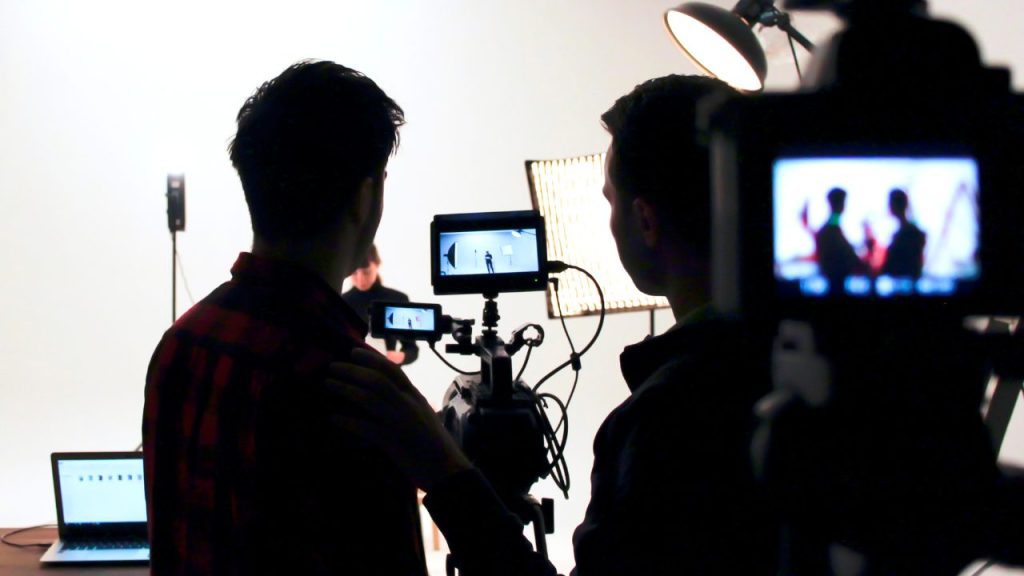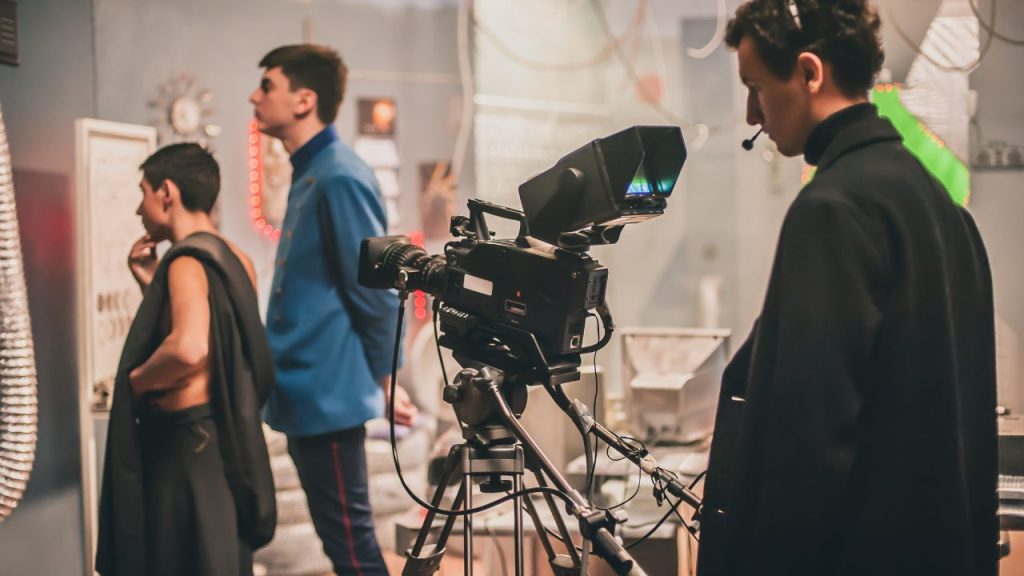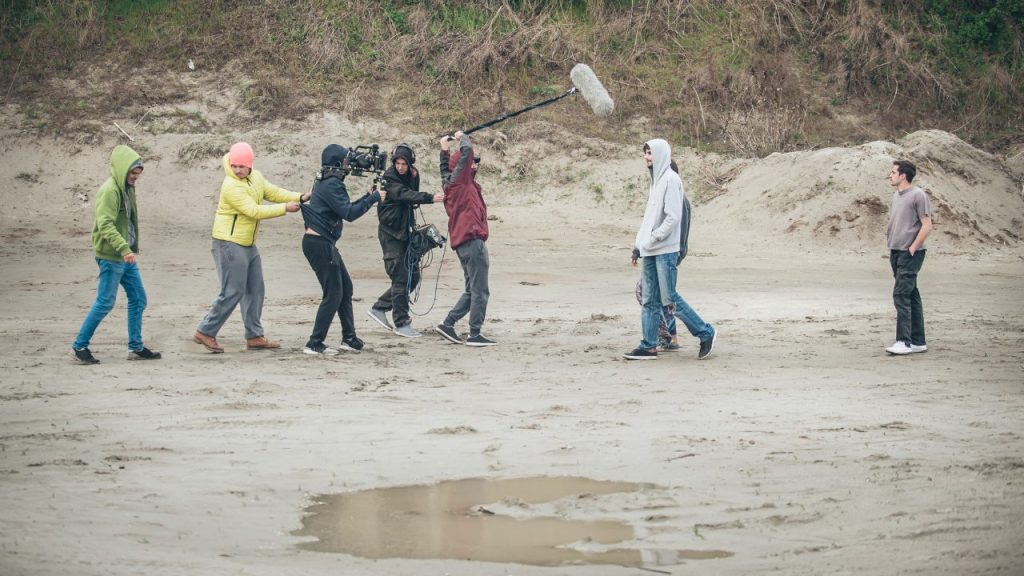Well, look who’s ready to dive into the glitz and glamour of Hollywood Film Industry. You want to be discovered like Lana Turner at Schwab’s, whisked away to fame and fortune. But here’s the thing, bucko: This ain’t the 1940s anymore. The biz just doesn’t work like that. To make it in movies nowadays takes grit, determination, and a whole lotta schlepping.
Hope you’ve got comfortable shoes, kid because you’re going to be fetching a lot of quadruple-shot soy lattes. But don’t let the grunt work get you down. Keep that sunny smile on your face and make friends with the teamsters, because you never know which assistant will turn out to be the next Scorsese.
This biz is tough, no doubt, but you have passion, so use it. Dust off that screenplay and start shooting shorts with your friends. Make yourself indispensable on set and always be networking. It’s a marathon, not a sprint, so pace yourself, and don’t quit your day job just yet.

But most of all, remember: Don’t let the jerks get you down, and never take no for an answer. This is your dream, so grab it by the horns and don’t let go! Now let’s get to work, Spielberg. Those sets aren’t going to PA themselves.
How to Get Jobs on Film Sets With No Experience
Want to work on movies without any experience? Be prepared to start at the absolute bottom – we’re talking production assistant (PA). As a PA, you’ll basically be an errand runner, getting people coffee, taking out the trash, and generally being everyone’s gopher.
Not glamorous, but everyone’s gotta start somewhere, right? The good news is PAs are always in demand and the hours are long, so you’ll get a crash course in how films are really made.
Make “Friends” (But Not Really)
The film industry is all about who you know, so start schmoozing! Attend every industry event, film festival, and happy hour you can. Chat up anyone with a headset or a laminated badge. Pretend you find their boring stories fascinating.

Laugh at their unfunny jokes. These tedious networking sessions are a rite of passage. Sure, you’ll meet a lot of self-important jerks, but you might also make a real connection or two. Just get used to kissing a lot of frogs along the way!
DIY or Die
Want experience but can’t land a PA gig? Make your own! Grab some friends and shoot a short film, music video, or web series. Create roles for yourselves and get experience doing actual film work. Finished projects you can share online or at film festivals are great for building your portfolio and resume.
They show you have initiative, understand how to run a set, and can follow through on completing a project from start to finish. Breaking into film isn’t easy or glamorous, but with patience, persistence, and a willingness to start small, you can work your way up.
Keep your head down, do good work, make genuine connections, and don’t be afraid to create your own opportunities. With time and experience, you’ll move from getting the coffee to calling the shots!
Most in-demand Entry-Level Jobs in the Film Industry

Production Assistant: The Film Industry’s Version of an Intern
Want to start at the bottom? Congrats, you’ve found it. As a PA, you’ll do anything and everything to help the production run smoothly. Need coffee? You’re on it. Need help setting up lighting? You’ve got this.
Want someone to drive the actors to the set at 3 am? That’s right, it’s you. The hours are long and the work is hard, but PAs get a front-row seat to the filmmaking process and a chance to network. Many successful filmmakers got their start fetching coffee as PAs.
Casting Associate: Help Find the Next Big Star
Do you have an eye for talent? Then casting could be your way in. Casting associates help review audition tapes, schedule talent, and coordinate the logistics of the casting process.
It’s an important job, even if you don’t get the final say. You’ll meet actors, agents, and directors, gaining valuable experience in how the Hollywood casting system really works. Just try not to crush too many dreams along the way.
Camera Operator: Calling All Techies
If you’re more interested in cameras than clapperboards, becoming a camera operator or assistant camera operator could be your way onto the set. You’ll help set up, operate, and maintain cameras during filming under the direction of the cinematographer.
It requires technical skills and knowledge of the latest camera equipment. The hours can be long, but you’ll learn the craft of visual storytelling firsthand. Some camera operators work their way up to director of photography.
The keys to breaking into the film industry are persistence, hard work, and an irreverent sense of humor. Opportunities are out there, you just have to be willing to start at the bottom and pay your dues. But for those bitten by the film bug, there’s no better place to be than on set, making movie magic.
Build Your Skills: Film School, Online Courses, and More

Film School: The Pros and Cons
Want to learn the “rules” of filmmaking before you break them? Film school is one way to go. You’ll study under experienced faculty, use state-of-the-art equipment, and build connections with your fellow film nerds. The downside? It’s expensive and time-consuming. If you’re in a hurry to break into the industry, film school may not be the quickest path.
Take an Online Course
These days you can learn pretty much anything online, and filmmaking is no exception. You can take specialized courses on screenwriting, cinematography, editing—you name it. The courses are often very affordable or even free. You’ll still need to get experience making films, but online courses are a great way to pick up the fundamentals at your own pace.
Just Start Filming!
The best way to learn filmmaking is by doing it. Grab some friends, get your hands on a camera (any camera—your phone will do), and start shooting. Make short films, sketches, music videos, whatever interests you.
Upload them to video sites to get feedback. Collaborate with other aspiring filmmakers. Put together a reel of your best work to show potential employers or collaborators. Raw experience trumps any amount of book learnin’.
Work for Free (Gasp!)
No, we’re not suggesting you work for free forever. But doing some pro bono work on actual film sets is the perfect way to gain valuable on-the-job experience. You’ll learn the ropes, make connections, and become an indispensable part of the crew—so much so, that they’ll want to start paying you.
As long as the work is truly educational, volunteering your time on a few projects can pay off big time for your career. The key is not to rely on any single path but to use all resources at your disposal to develop your skills and break into this crazy, masochistic industry we call filmmaking. Take a few lumps, pay your dues, and before you know it, you’ll be the one yelling “Action!”
Networking Opportunities to Meet Industry Professionals

So you want to meet the movers and shakers in film, huh? The good news is, there are plenty of places to do that—if you’re willing to put in the legwork. Gone are the days of schmoozing over martinis at the Polo Lounge. Nowadays, real networking happens at industry events, film festivals, and online.
Film Festivals: Where Art Meets Opportunity
Film festivals are a breeding ground for networking. You’ve got directors, producers, actors—the whole shebang—all gathered in one place.
Strike up a conversation with someone in line for free food, compliment them on their “visionary” short film, and get their business card—the world is your networking oyster. The trick is actually following up and maintaining the connection. No one likes a fair-weather friend.
Online: It’s Not (Just) About Selfies and Cat Videos
Believe it or not, you can do some quality networking from the comfort of your couch in your pajamas. Join relevant LinkedIn groups, like “Entertainment Industry Network” or “Filmmakers Networking Group,” and start conversations.
Reach out for informational interviews. Slide into those DMs on Instagram and Twitter. Just be sure to do it in an authentic, non-creepy way. Comment on people’s posts, ask thoughtful questions, offer to help, or collaborate if possible. Make genuine connections that could lead to mentorship or job opps down the line.
Professional Organizations: Pay to Play
Fork over the membership fees to join film organizations like Women in Film, Film Independent, or the DGA. Attend their events, screenings, panels, and mixers. Get engaged, volunteer for committees, and make personal introductions when possible.
Over time, these organs can become an invaluable part of your network and support system in what can be a challenging industry. The truth is, in a field as competitive as film and television, networking may be the only way in—especially if you lack experience or connections.
Sure, it requires effort, but as the saying goes, “It’s not what you know, it’s who you know.” So get out there—online and IRL—and get to know as many whos as you can. With perseverance, that big break could be just one handshake (or DM) away.
Creating a Standout Portfolio and Reel to Showcase Your Talent

So you want to break into the glamorous world of film, do ya? Well, listen up greenhorn, because if you want to make it in this town, you’re going to need more than just a can-do attitude and a winning smile. You need a portfolio and reel that screams “Hire me now before the competition snatches me up!”
The Portfolio: Your Calling Card
A solid portfolio showcases your very best work. Are you a screenwriter? Include some short scripts or spec scripts for existing shows. An editor? Put together a sizzle reel of scenes you’ve cut together. Director?
Include short films, commercials, music videos—anything that highlights your vision. The key is to make sure each piece in your portfolio is high quality and represents your unique style. Keep it short, around 3 to 5 minutes max. You want people begging for more, not yawning and checking their watches.
The Reel: Your 15 Minutes of Fame
If you’re an actor, your reel is your lifeline. It’s your chance to show casting agents and directors exactly what you can do in a short amount of time. Include snippets of your very best performances in student films, web series, or any other work you’ve done.
Show range by including both comedic and dramatic performances. Keep your reel under 2 minutes—any longer and you risk losing interest. The reel should make the viewer want to call you in for an audition right now.
A killer portfolio and reel, combined with a never-say-die attitude, are your tickets to success in this crazy industry. While breaking in isn’t easy, with hard work and persistence, you’ll soon be hobnobbing with A-listers at craft services. But don’t forget the little people who helped you on your way up, ya hear? Now go get ‘em, tiger!
Conclusion
And scene! If you wanna make it in La La Land, remember that Rome wasn’t built in a day. Sure, you could spend years waiting on your big break bussing tables, or slinging lattes, but why not grab the industry bull by the horns?
Who knows, with some pluck and a little luck, you could be walking the red carpet in no time. Just don’t let the glitz go to your head, kid. Stay humble and keep reaching for the stars. The show must go on, with or without you. Make it happen, capisce? Lights, camera, action!
Read More : Top 7 Fastest Growing Instagram Niches to Make Money in 2024
 Oko Dot All In One Technology Solutions By Likhon Hussain
Oko Dot All In One Technology Solutions By Likhon Hussain
